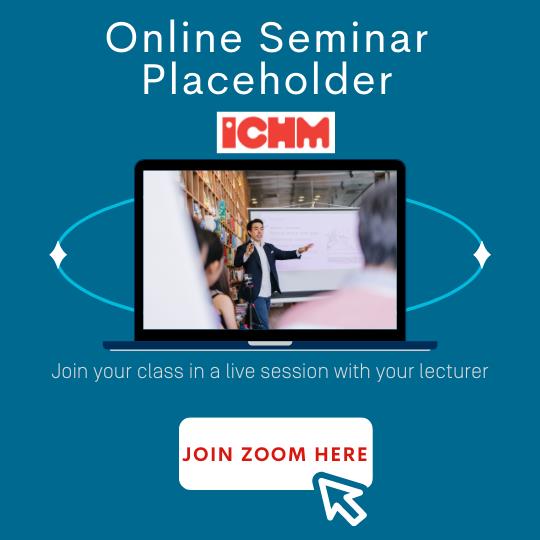Welcome to Topic 7: Career Jumpstart: Employability, Personal Branding and the Beginning of a Career. This topic will provide the skills and resources you require to enter the workforce with confidence. A range of interesting and engaging tasks will help you develop a better understanding of how you can personally develop your employability skills for your chosen career path. In this topic, you will learn about:
- The concept of employability
- How to create your own employability plan
- Preparing for the future of work
- Discovering your personal brand.
These relate to the Subject Learning Outcomes:
- Discuss the written, verbal, listening and non-verbal communication skills in academic, professional and intercultural settings.
- Build a professional physical and online profile that showcases your knowledge, skills and attributes.
Welcome to your pre-seminar learning tasks for this week. Please ensure you complete these prior to attending your scheduled seminar with your lecturer. Click on each of the following headings to read more about what is required for each of your pre-seminar learning tasks as you work your way through the LMS.

What does it mean to be competent in the employability skills listed in the provided worksheet? The first step is to understand what each of these employability skills are. The following worksheet can be added to your reflective journal so that you can discuss this in the upcoming seminar. You can access the reflective journal by clicking on ‘Journal’ in the navigation bar for this subject.
- Use the worksheet to define each of the employability skills listed.
- Use the worksheet to number the skills in order from 1 - the skill you feel most comfortable and capable of displaying to 30 - being the skill you feel most unsure about and feel you may not be as proficient as you would like.
- Be prepared to discuss these skills in this topic’s corresponding seminar.
Create your own employability plan by completing the questionnaire provided on the website.
When complete, upload your plan document to your reflective journal for formative review by your lecturer. This plan will be used for Task 3.
Using Artess’ (2017) table of employability skills (located in the worksheet) select five (5) focus skills that you would like to work on during your time in industry and add to worksheet 2. List ways in which you can work on these five (5) skills whilst completing your placement or whilst within your current or future employment. This worksheet can be added to your reflective journal so that you can discuss this in the upcoming seminar.
World Economic Forum - Read the article The three (3) key skill sets for the workers of 2030. Think about which employability skills you can work on to enhance your future job prospects and place them in your reflective journal.
Who doesn’t love a good podcast?
Head to the following article listing The 7 best podcasts for developing your personal brand - Discover the Best Podcasts | Discover Pods.
Select three (3) podcasts (they can be from the same host or varying hosts from the list).
Complete the tasks in 'Topic 7: Forum Activity 1'. You can also navigate to the forum by clicking on 'ESK100 Subject Forum' in the navigation bar for this subject.

What is employability?
The world of work is a constantly evolving phenomenon. The future of work will see a pace of change surpassing anything we have seen before, along with an increase in global connectivity, advances in science and technology which will change the political, economic and social landscape. The constructs of the workforce and the organisations which house them have started to change shape before our eyes. In this digital era, we see a shift in the mindset and skills required to obtain a personal and professional competitive advantage. The need for employees to develop and maintain a crucial set of employability skills portable enough to transcend multiple jobs and industries is increasing. During this topic, we will define employability and look at what it means for each of you as individuals.
Providing a definition of employability is not as simple as one might imagine. The concept of employability has enjoyed a distinct move from a dichotomy of either being employed or being unemployed, to employability being considered as an adaptable creature, dynamic in its nature (Williams, Dodd, Steele, & Randall 2016). An early definition by Hillage and Pollard (1982, p. 2) describes employability as:
the capability to move self-sufficiently within the labour market to realise potential through sustainable employmentHillage and Pollard
This would be critiqued today as “ignoring labour market and economic realities” (Speight, Lackovic & Cooker 2013) as well as not maintaining an outlook on the changing nature of employment and the changing context of sustainable employment.
Harvey (2005, p.13) goes on to say, “however employability is not just about getting a job; it is about developing attitudes, techniques and experiences for life”. This provides a position which infers that employability is not just a personal condition which an individual seeks to occupy, rather, it is a notion that employable individuals have a higher propensity to gain employment. The terms ‘attitude’ and ‘techniques’ from within Harvey’s (2005) definition shines light on the necessity of skills and knowledge within the context of employability. We are not just looking at graduate employability as a means to simply gain a job, we are looking at the ability of the graduate to develop upon a multitude of generic skills to gain a job within the graduates desired industry and field of choice. This gives rise to the competence-based approach to employability. How an individual perceives their abilities, personal attributes and skills and is able to pursue and gain employment opportunities in areas specific to their interest and expertise (Knight & Yorke 2004). Yorke and Knight (2006, p.8) continue to extend on this with their final definition adopted by the UK’s Higher Education Academy defining employability as:
A set of achievements – skills, understandings and personal attributes – that make individuals more likely to gain employment and be successful in their chosen occupations, which benefits themselves, the workforce, the community and the economyYorke and Knight
The above definition is what we will utilise as we look to define your individual current employability status and the areas in which you need to develop as you move through to the final goal of Work Integrated Learning and its industry placement.
What does employability look like?
Skills, knowledge, and attributes underpin the competency-based model of employability. Employability skills appear to be categorised into two distinct areas: discipline specific skills and knowledge, and generic/transferable skills and knowledge (Clanchy & Ballard 1995). There is a range of literature focused on proposing a myriad of competencies an individual is required to develop to increase their employability (Andrews & Russell 2012; Barrie 2006; Cavanagh, Burston, Southcombe, & Bartram 2015; Jackson 2014; Kalfa & Taksa 2015). These varying frameworks have identified the following list of possible skills or attributes required of a graduate perceived to have developed the appropriate level of employability (Artess et al. 2017, p.17):
| Adaptability | Efficiency | Problem-solving |
| Aspiration | Emotional intelligence | Resilience |
| Attitude | Entrepreneurship | Self-direction |
| Autonomy | Ethics | Self-management |
| Career management | Initiative | Social intelligence |
| Communication skills | Interpersonal skills | Teamwork |
| Creativity | Multi-tasking | Time management |
| Critical thinking skills | Numeracy | Willingness to learn |
| Customer awareness | Opportunity awareness | Work ethic |
| Digital literacy | Presentation skills | Writing skills |
Preparing for the future of work
There is no hiding the massive discussion on how Artificial Intelligence (AI) will impact the jobs of the future. People will either have a utopian view of AI and how it will enhance our ability to be productive in the workplace or a dystopian view, a fear of how AI will negatively impact the future of work and the number of jobs available for people within the workplace. The fourth industrial revolution comes with an uncertainty due to the rapid technological change.
The way in which we can prepare for these uncertain times in by ensuring we continue to develop employability skills which are portable across a range of job roles and industries. The World Economic Forum have provided a skills outlook discussed within the asynchronous Learning Task 4 - World Economic Forum activity. This outlines the growing skills versus those skills which will decline over the coming years. Placing our focus on more cognitive skills will place us in the best position to continue to be successful in the workplace.
Developing my personal brand

This week we will explore your personal brand in the scheduled seminar through a number of activities but firstly what is a personal brand?
The creation of a personal brand is the ongoing creation of a prescribed image and impression in the minds of others about an individual.
When you have a personal brand, you have the ability to create an association that people have with you before, during and post meeting. This can be done through social media channels, personal interactions, and the use of networking techniques. We have all heard of the saying ‘it is not what you know, it is who you know’. Social media has strengthened this quote by becoming a gateway to connecting with industry professionals and influencers, however it has also strengthened the need to be real, factual and talk to what you know with integrity and honesty.
A multitude of benefits can come from creating an effective personal brand:
- Creating a strong personal brand can positively influence your career
- The development of a personal brand can increase your sense of self and allow for continued and purposeful growth
- Cultivating a personal brand can increase your ability to think strategically
- Building your brand allows for a conscious focus on the delivery of value to current and prospective employers
- Personal branding can assist in helping you define your specialisation
- A personal brand assists to build self-confidence as you focus on the positive attributes of your self-identity
- A personal brand allows you to shape your own story.
Be ready to complete the personal branding exercises by discovering your employability strengths and opportunities via the self-directed learning tasks.
There are many ways to develop a personal brand. We are going to complete the personal brand workshop by exploring who we are and breaking our thoughts down into 10 steps:
Developing your employability skills and understanding their importance at an early stage will help to set you up for a pathway to success. Developing your own personal brand is a core aspect of this pathway and will require time and thought as you start to understand the professional requirements expected of you. Reflect on the concepts discussed in this topic and continue to refer back to the information as you start to think about your own personal brand.
Knowledge check
Complete the following four tasks. Click the arrows to navigate between the tasks.
Key takeouts
Congratulations, we made it to the end of the seventh topic! Some key takeouts from Topic 7:
- Employability is more than obtaining employment, it is about growing attitudes, techniques and experiences for life.
- There are a range of skills that make up employability, the two distinct areas are discipline specific and transferable skills and knowledge.
- A personal brand is the continuous creation of a prescribed image and impression in the minds of others about an individual
Welcome to your seminar for this topic. Your lecturer will start a video stream during your scheduled class time, you can access your scheduled class by clicking on ‘Live Sessions’ found within your navigation bar and locating the relevant day/class or by clicking on the following link and then click 'Join' to enter the class.
Click here to access your seminar.
The learning tasks are listed below, these will be completed during the seminar with your lecturer. Should you be unable to attend, you will be able to watch the recording which can be found via the following link or by navigating to the class through ‘Live Sessions’ via your navigation bar.
Click here to access the recording. (Please note: this will be available shortly after the live session has ended.)

In-seminar learning tasks

The in-seminar learning tasks identified below will be completed during the scheduled seminar. Your lecturer will guide you through these tasks. Click on each of the following headings to read more about the requirements for each of your in-seminar learning tasks.
Working in a breakout room assigned by your lecturer during the scheduled seminar, complete the following: This learning task requires you to complete a range of activities using this worksheet. These activities will help you to understand and reflect on:
- What are your values?
- What are you passionate about?
- Who are your influencers?
- What are your goals?
- How do others describe you?
- Core strength reflection – where can I improve?
Welcome to your post-seminar learning tasks for this week. Please ensure you complete these after attending your scheduled seminar with your lecturer. Your lecturer will advise you if any of these are to be completed during your consultation session. Click on each of the following headings to read more about the requirements for each of your post-seminar learning tasks.
Reflect on your learnings from this week and contact your lecturer if you have any questions
- Review the requirements for assessment 1 and start drafting a response.
- Continue your assessment 3 draft and collect three more articles.
Each week you will have a consultation session which will be facilitated by your lecturer. You can join in and work with your peers on activities relating to this subject. These session times and activities will be communicated to you by your lecturer each week. Your lecturer will start a video stream during your scheduled class time, you can access your scheduled class by clicking on ‘Live Sessions’ found within your navigation bar and locating the relevant day/class or by clicking on the following link and then click 'Join' to enter the class.
Click here to access your seminar.
Should you be unable to attend, you will be able to watch the recording which can be found via the following link or by navigating to the class through ‘Live Sessions’ via your navigation bar.
Click here to access the recording. (Please note: this will be available shortly after the live session has ended.)

- California Polytechnic State University 2012, The Importance of Personal Branding: Uses of Personal Branding for Career Development and Success
- Stockholm University 2013, Personal Branding Through Imagification in Social Media
References
- Andrews, G & Russell, M 2012, 'Employability skills development: strategy, evaluation and impact', Higher Education, Skills and Work-Based Learning, 2(1):33-44.
- Artess, J, Mellors-Bourne, R & Hooley, T 2017, Employability: A review of the literature 2012-2016, York: Higher Education Academy.
- Barrie, S 2006, 'Understanding what we mean by the generic attributes of graduates', Higher Education, 51(2):215-241.
- Bolton, R 2009, People skills, Simon and Schuster.
- Bonebright, DA 2010, '40 years of storming: a historical review of Tuckman's model of small group development', Human Resource Development International, 13(1):111-120.
- Cavanagh, J, Burston, M, Southcombe, A & Bartram, T 2015, 'Contributing to a graduate-centred understanding of work readiness: An exploratory study of Australian undergraduate students' perceptions of their employability', The International Journal of Management Education, 13(3):278-288.
- Clanchy, J & Ballard, B 1995, 'Generic skills in the context of higher education', Higher Education Research and Development, 14(2):155-166.
- Cole, K 2019, Leadership and Management: Theory and Practice, 7th edn., Cengage Learning Australia.
- Dwyer, J 2016, Communication for Business and the Professions: Strategies and Skills, 6th edn., Pearson Higher Education AU.
- Harvey, L 2005, 'Embedding and integrating employability', New Directions for Institutional Research, 2005(128):13-28.
- Hillage, J & Pollard, E 1982, Employability: Developing a framework for policy analysis, Department for Education and Employment.
- Jackson, D 2014, 'Testing a model of undergraduate competence in employability skills and its implications for stakeholders', Journal of Education and Work, 27(2):220-242.
- Kalfa, S & Taksa, L 2015, 'Cultural capital in business higher education: reconsidering the graduate attributes movement and the focus on employability', Studies in Higher Education, 40(4):580-595.
- Knight, P & Yorke, M 2004, Assessment, Learning And Employability, McGraw-Hill Education.
- Minnesota Libraries 2015, Business Communication for Success, University of Minnesota.
- Mullins, LJ 2016, Management and organisational behaviour, 11th edn., Pearson education.
- Newman, A & Ober, S 2016, Business communication: In person, in print, online, 10th edn., Cengage Learning.
- O'Reilly, J, Robinson, SL, Berdahl, JL & Banki, S 2014, 'Is negative attention better than no attention? The comparative effects of ostracism and harassment at work', Organization Science, 26(3):774-793.
- Raven, BH 1992, ‘A power/interaction model of interpersonal influence: French and Raven thirty years later’, Journal of Social Behavior & Personality, 7(2):217-244.
- Reardon, KK 1987, Interpersonal communication: Where minds meet, Wadsworth publishing company.
- Speight, S, Lackovic, N & Cooker, L 2013, 'The Contested Curriculum: Academic learning and employability in higher education', Tertiary Education and Management, 19(2):112-126.
- Triandis, HC, Dunnette, MD & Hough, LM 1994, Handbook of industrial and organizational psychology, 2nd edn., Consulting Psychologists Press.
- Williams, S, Dodd, LJ, Steele, C & Randall, R 2016, 'A systematic review of current understandings of employability', Journal of Education and Work, 29(8):877-901.
- World Economic Forum 2016, 'The future of jobs: Employment, skills and workforce strategy for the fourth industrial revolution', paper presented to World Economic Forum.
- Yorke, M & Knight, P 2006, Embedding employability into the curriculum, vol. 3, Higher Education Academy York.

